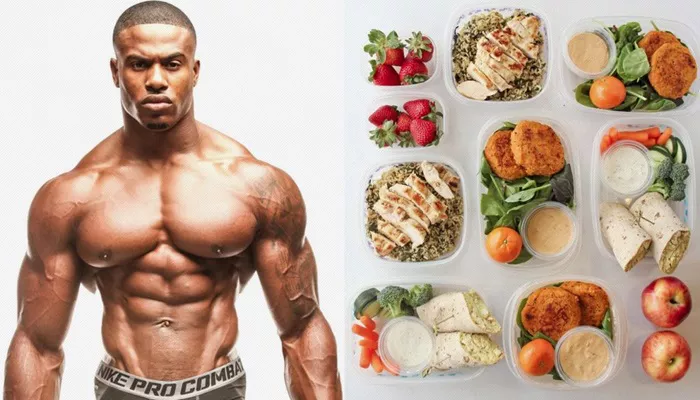Muscle building is to promote the growth and repair of muscle fibers through strength training and proper nutrition intake. Common methods include gravity training, high-protein diet and adequate rest to increase muscle volume, strength and endurance. Long-term persistence can improve body composition and enhance athletic performance.
Muscle Building Meal Plan
A muscle-building meal plan is essential for supporting your fitness goals, as it provides the necessary nutrients for muscle repair, growth, and overall recovery. When aiming to build muscle, your diet should focus on the right balance of macronutrients: protein, carbohydrates, and fats, along with proper hydration.
1. Protein:
Protein is the cornerstone of any muscle-building meal plan. Aim for about 1.6 to 2.2 grams of protein per kilogram of body weight daily. Protein helps repair and grow muscle tissues after workouts. Good sources include chicken, turkey, lean beef, eggs, fish (like salmon and tuna), and plant-based options like lentils, chickpeas, tofu, and quinoa.
2. Carbohydrates:
Carbs provide energy for your workouts and replenish glycogen stores in muscles after exercise. Aim to consume complex carbs like whole grains (brown rice, oats, quinoa), vegetables, and fruits. These provide sustained energy and important vitamins and minerals.
3. Healthy Fats:
Healthy fats support hormone production, including testosterone, which plays a key role in muscle growth. Incorporate sources like avocado, olive oil, nuts, seeds, and fatty fish like salmon.
4. Meal Timing:
Eat every 3-4 hours to ensure a steady supply of nutrients for muscle recovery and growth. A balanced pre- and post-workout meal can significantly enhance results. A good post-workout meal should be rich in protein and carbs to speed up recovery.
5. Hydration:
Stay hydrated, as dehydration can negatively impact performance and recovery. Drink plenty of water throughout the day and especially after your workouts.
A sample day might look like:
Breakfast: Scrambled eggs with whole-grain toast and avocado
Lunch: Grilled chicken with quinoa and mixed vegetables
Snack: Greek yogurt with almonds
Dinner: Salmon with sweet potatoes and broccoli
How to Build Muscle for Beginners
Building muscle for beginners requires a combination of proper exercise, nutrition, and recovery. If you’re just starting, here are some essential steps to help you get started:
Start with Compound Exercises
Compound exercises engage multiple muscle groups, making them perfect for beginners. Key movements like squats, deadlifts, bench presses, and pull-ups should be the foundation of your workout routine. These exercises help build overall strength and stimulate muscle growth across large muscle groups.
Focus on Progressive Overload
To build muscle, you need to progressively challenge your muscles. This means gradually increasing the weight or resistance over time. Start with weights you can lift comfortably and increase the load as your strength improves. Aim for adding weight or reps every few weeks to keep your muscles growing.
Train Each Muscle Group 2-3 Times Per Week
A balanced workout routine should target each muscle group multiple times per week. Beginners typically benefit from full-body workouts, 3 times a week, allowing sufficient time for recovery between sessions. After some experience, you can switch to a split routine focusing on specific muscle groups each day.
Prioritize Nutrition
Nutrition plays a vital role in muscle building. Ensure you’re eating enough calories to support muscle growth. A high-protein diet is essential, as protein is the building block for muscle repair. Aim for 1.6 to 2.2 grams of protein per kilogram of body weight per day. Also, include healthy fats and carbohydrates to fuel your workouts and aid recovery.
Rest and Recovery
Muscles grow when they rest, not when you’re training. Ensure you’re getting enough sleep (7-9 hours per night) and allowing muscles at least 48 hours to recover between intense sessions. Overtraining can lead to injury and hinder muscle growth.
Muscle Building Related Posts
FAQs About Muscle Building
1. How to Start Muscle Building?
Set Clear Goals: Identify your fitness goals (e.g., strength, size, endurance).
Follow a Structured Program: Include resistance training with exercises like squats, deadlifts, bench press, and rows.
Progressive Overload: Gradually increase weight or repetitions to challenge muscles.
Rest and Recovery: Allow muscles to recover by resting between workouts.
2. Can You Build Muscle After 40?
Yes, you can! While it may be slower than when you’re younger due to hormonal changes, consistent resistance training, proper nutrition, and recovery can help build muscle at any age.
3. How Many Eggs a Day to Build Muscle?
Typically, 3-6 eggs per day are beneficial for muscle building, as they provide high-quality protein and essential nutrients. However, the exact amount depends on your overall diet and protein needs.
4. How Much Protein for Muscle Building?
A general guideline is to consume 1.6 to 2.2 grams of protein per kilogram of body weight per day for muscle building. For example, a 70kg (154lb) person would need around 112-154 grams of protein daily.


